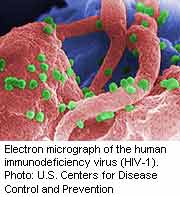Two studies show benefits in patients with asymptomatic HIV and in African patients
TUESDAY, July 21, 2015 (HealthDay News) — Early initiation of antiretroviral therapy (ART) is associated with improved outcomes in HIV, according to two studies published online July 20 in the New England Journal of Medicine to coincide with the International AIDS Society 2015 Conference, held from June 19 to 22 in Vancouver, Canada.
Jens D. Lundgren, M.D., from the University of Copenhagen in Denmark, and colleagues randomized HIV-positive asymptomatic adults with a CD4+ count of more than 500 cells/mm³ to start ART immediately or defer initiation. The researchers followed 4,685 patients for a mean of 3.0 years. On the basis of an interim analysis, the data and safety monitoring board determined that patients in the deferred initiation group should be offered ART. Any serious AIDS-related event, serious non-AIDS-related event, or death from any cause occurred in 1.8 and 4.1 percent of the immediate- and deferred-initiation groups, respectively (hazard ratio, 0.43; P < 0.001).
Christine Danel, Ph.D., from the Université de Bordeaux in France, and colleagues examined the benefits of early ART, six-month isoniazid preventive therapy (IPT), or both among 2,056 HIV-infected adults with high CD4+ cell counts. The researchers observed 204 primary end point events during 4,757 patient-years. The risk of death or severe HIV-related illness was lower for early versus deferred ART (adjusted hazard ratio, 0.56) and for IPT versus no IPT (adjusted hazard ratio, 0.65).
“In this African country, immediate ART and six months of IPT independently led to lower rates of severe illness than did deferred ART and no IPT,” the authors write.
In the Lundgren study, antiretroviral drugs were donated by pharmaceutical companies.
Copyright © 2015 HealthDay. All rights reserved.








